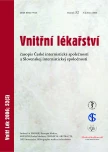-
Medical journals
- Career
The Nosocomial Infections and Diabetes
Authors: E. Míčková
Authors‘ workplace: Hygienický odbor FN, Hradec Králové, ředitel doc. MUDr. Leoš Heger, CSc.
Published in: Vnitř Lék 2006; 52(5): 434-437
Category: Diabetes and other subjects (infection, dermatovenerology and rheumatology) Hradec Králové 3 to 4 June 2005
Overview
The higher incidence of the nosocomial infections is induced of the advances in the diagnostic and therapeutic medicine. The nosocomial infections are divided in non-specific, specific, endogenous and exogenous infections. Diabetes comes under the risk factors of these infections. The rigid adherences to the epidemiological measures and regular control of them may lower the ocurence of the nosocomial infections.
Keywords:
nosocomial infections – diabetes mellitus – risk factors – epidemiological measures
Sources
1. Zákon č. 258/2000 Sb., ze dne 14. července 2000 o ochraně veřejného zdraví a o změně některých souvisejících zákonů.
2. Vyhláška č. 195/2005 Sb., ze dne 18. května 2005, kterou se upravují podmínky předcházení vzniku a šíření infekčních onemocnění a hygienické požadavky na provoz zdravotnických zařízení a ústavů sociální péče.
3. Infection Control literature review, http://www.health.vic.gov.au/infcon/bg.htm
4. Debra L, Malone H. et al. Surgical-site infection: reanalysis of Risk Factors. Journal of Surgical Research 2002; 103 : 89-95.
5. Kamf G et al. Analysis of risk factors for nosocomial infections - results from the first national prevalence survey in Germany (NIDEP study, part 1). Journal of Hospital Infection, 1997; 37 : 103-112.
6. Grey NJ, Perdrizet GA. Reduction of nosocomial infections in the surgical intensive care unit by strict glycemic control. Endocr Pract 2004; 10(Suppl 2): 46-52.
7. Harrington G and al. Surgical-site infection rates and risk factor analysis in coronary bypass graft surgery. Infect Control Hosp Epidemiology 2004; 25 : 472-476.
8. Sweenna CL et al. Peri-operative glucose control and development of surgical wound infections in patients undergoing coronary bypass graft. Journal of Hospital Infection 2005; 61 : 201-212.
9. Erika MC. Hospital - Acquired Infections in Chronic Hemodialysis Patients. Infec Med 2001; 18 : 305-311.
10. Rogham M et al. Epidemiology of capsular and surface polysaccharide in Staphylococcus aureus infections complicated by bacteraemia. Journal of Hospital Infection 2005; 59 : 27-32.
11. Panhotra BR, Saxena AK, Al-Ghamdi AM. Extended beta-lactamase-producing Klebsiella pneumoniae hospital acquired bacteremia. Risk factors and clinical outcome. Saudi Med J 2004; 25 : 1871-1876.
12. Schroder Hansen D, Gottschau A, Jorn Kolmos H. Epidemiology of Klebsiella bacteraemia - a case control study using Escherichia coli bacteraemia as contro. Journal of Hospital Infection 1998; 38 : 119-132.
13. Krinsley JS. Effect of an intensive glucose management protocol on the mortality of critically ill adult patients. Mayo Clin Proc 2004; 79 : 992-1000.
14. Šrámová H et al. Nozokomiální nákazy II. Praha: Maxdorf 2001.
16. Šrámová H et al. Nozokomiální nákazy. Praha: Maxdorf 1995.
Labels
Diabetology Endocrinology Internal medicine
Article was published inInternal Medicine

2006 Issue 5-
All articles in this issue
- The Nosocomial Infections and Diabetes
- Diabetes mellitus and immunization
- A role of diabetologist in management of infections in diabtics
- Pathogenesis of the connective tissue in diabetes
- Metabolic PPAR receptors and skin
- Diabetic skin changes from the dermatological point of view
- Healing of skin lesions in diabetic foot syndrome during hospitalization
- Infections and diabetic foot syndrome in field practice
- Sodium Hyaluronate and an Iodine Complex - Hyiodine® - New Method of Diabetic Defects Treatment
- Urinary tract infection in patients with diabetes mellitus
- Respiratory infections and inhalation insulin therapy
- Effects of insulin on glucose metabolism in sepsis
- Internist's view on skin manifestations of hyperlipidemia in diabetic patients
- Mycoses and diabetes
- Skin complications of diabetes mellitus therapy
- Diffuse idiopathic skeletal hyperostosis and its relation to metabolic parameters
- Rheumatologic manifestations in diabetes
- Metabolic bone diseases and diabetes
- Gout and diabetes
- Glucocorticoids and diabetes mellitus
- Anagrelide in the treatment of essential thrombocythemia (ET) and other myeloproliferative disorders with thrombocythemia based on data from patient register in the CR
- Internal Medicine
- Journal archive
- Current issue
- Online only
- About the journal
Most read in this issue- Diabetic skin changes from the dermatological point of view
- Glucocorticoids and diabetes mellitus
- Diffuse idiopathic skeletal hyperostosis and its relation to metabolic parameters
- Skin complications of diabetes mellitus therapy
Login#ADS_BOTTOM_SCRIPTS#Forgotten passwordEnter the email address that you registered with. We will send you instructions on how to set a new password.
- Career

